Understanding the Power of Neuropsychological Testing in Therapy Planning
Neuropsychological assessments are vital tools in the landscape of modern medicine and rehabilitation. They provide detailed insights into brain functioning, helping clinicians craft personalized and effective therapy strategies. This article explores how neuropsychological test results serve as a foundational element in developing tailored interventions, guiding clinical decisions, and improving patient outcomes.
The Role of Neuropsychological Evaluation in Early Diagnosis and Intervention
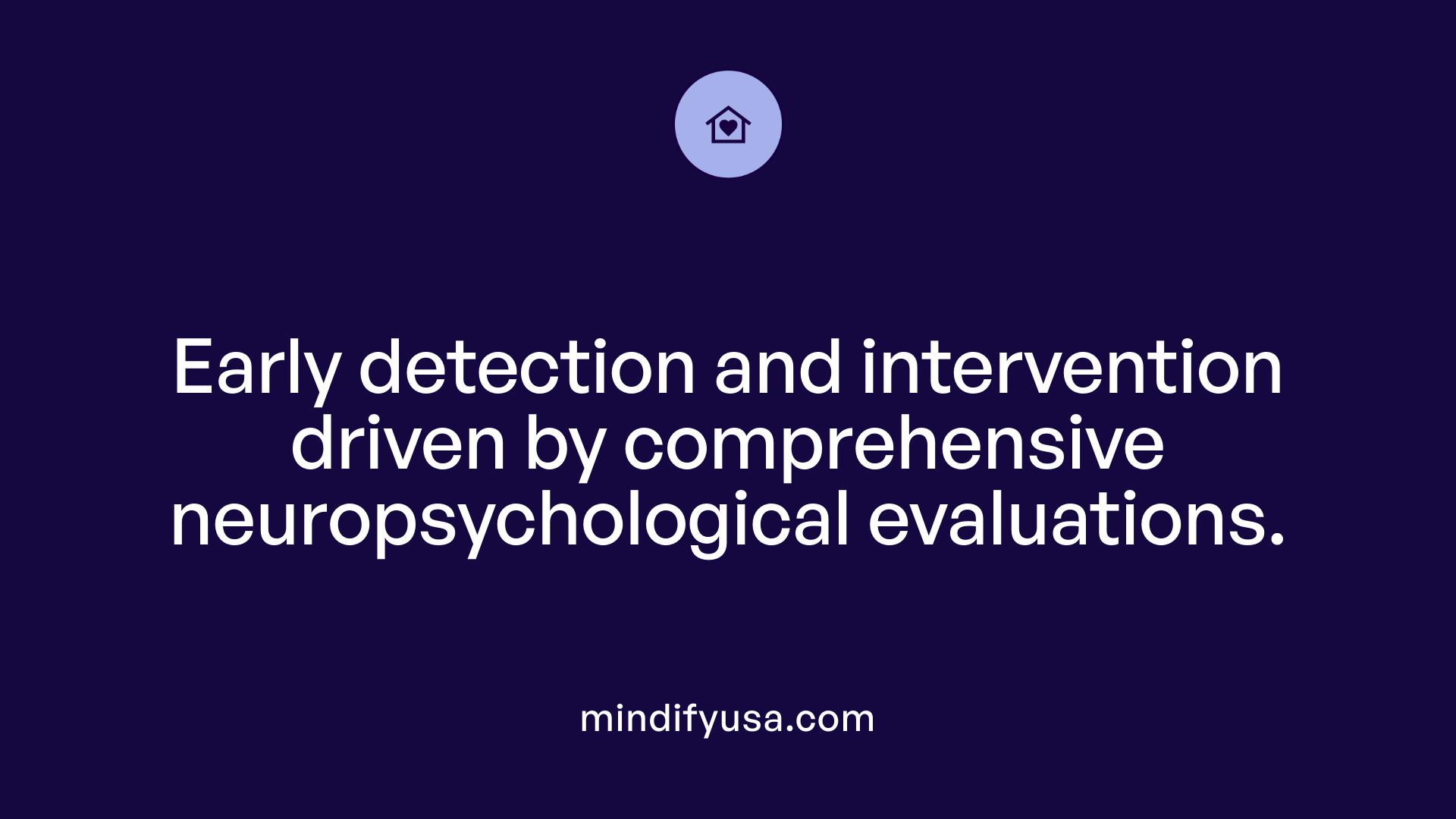
How are neuropsychological assessments used to develop or guide therapy plans?
Neuropsychological assessments are vital in creating personalized therapy strategies by pinpointing specific cognitive, emotional, and behavioral strengths and challenges in individuals. These evaluations include a comprehensive battery of standardized tests along with clinical observations, which help produce a detailed cognitive profile. This profile reveals the underlying causes of symptoms, such as memory issues, language difficulties, or executive function impairments.
The detailed results enable clinicians to tailor rehabilitation efforts effectively. For example, if testing indicates issues with problem-solving or attention, targeted cognitive training can be prioritized. These assessments also serve to establish baseline functioning, monitor patient progress over time, and fine-tune ongoing treatment plans.
Furthermore, neuropsychological findings support decision-making related to daily activities, such as the patient's ability to return to work, drive safely, or engage in independent living. Combining neuropsychological data with insights from other health professionals ensures that interventions are holistic, addressing both cognitive deficits and emotional well-being. This integrated approach enhances the effectiveness of therapy and helps improve overall quality of life.
How do neuropsychological test scores help in clinical decision-making?
Test scores from neuropsychological evaluations offer objective measurements of an individual’s cognitive and emotional functioning. These standardized scores are compared against normative data adjusted for age and education. Such comparisons help clinicians identify significant deviations from typical performance, pinpointing specific areas of impairment.
These scores are crucial for differentiating between various neurological conditions, such as different types of dementia, traumatic brain injury, or developmental disorders like ADHD and learning disabilities. For instance, a pattern of poor executive functioning coupled with preserved language skills might suggest a particular diagnosis, guiding targeted treatment options.
In addition, test scores serve as benchmarks that help clinicians track changes over time, assessing disease progression or recovery. They also assist in deciding the appropriateness of specific interventions or the patient's capacity to undertake certain activities legally or socially, such as driving or employment.
By integrating test results with clinical observations and patient history, neuropsychologists formulate comprehensive, evidence-based decisions for individualized care plans. These scores act as a foundation for tailoring treatments, whether pharmacologic, behavioral, or rehabilitative, ensuring that interventions are appropriately matched to the patient’s needs.
Identification of mild cognitive impairment and dementia
Early detection of mild cognitive impairment (MCI) and various forms of dementia remains a primary focus of neuropsychological evaluations. These assessments can identify subtle changes in cognitive functions that may not be evident through routine clinical examination.
By testing specific domains like memory, executive functioning, visuospatial skills, and language, clinicians can pinpoint early signs of cognitive decline. For instance, difficulties in memory retrieval or problems with planning and problem-solving may be indicative of initial Alzheimer’s disease or other dementias.
Accurate identification at the onset allows for timely intervention, which can slow disease progression and enhance quality of life. Moreover, early diagnosis aids in planning future care needs and considering appropriate treatments or lifestyle modifications.
Assessment of decision-making capacity
Neuropsychological evaluations play a crucial role in assessing an individual's decision-making abilities, especially in the context of cognitive impairment. Testing focuses on skills necessary for understanding, reasoning, and appreciating the consequences of decisions.
These evaluations are often used in legal, medical, or social contexts to determine whether a person can make informed choices about their treatment, finances, or living arrangements. By analyzing performance on tasks involving judgment, problem-solving, and understanding complex information, clinicians can determine the extent of an individual’s decision-making capacity.
When impairments are detected, the assessment results help inform whether additional support or legal guardianship is necessary to protect the individual’s interests.
Differentiation of dementia types and prediction of functional outcomes
Neuropsychological testing is highly effective in distinguishing between different types of dementia such as Alzheimer’s disease, vascular dementia, Lewy body dementia, and frontotemporal dementia. Each condition exhibits unique cognitive patterns that tests can reveal.
For example, Alzheimer’s typically presents with early memory impairments, while frontotemporal dementia may initially affect language and behavior. Identifying these patterns helps clinicians specify diagnoses with nearly 90% accuracy.
In addition, the assessment results predict how cognitive impairments will impact daily functioning, including independence in activities of daily living or partnership with caregivers. This information is critical for planning appropriate therapeutic, social, and medical interventions.
Establishing diagnostic accuracy and awareness of brain impairments
The standardized and validated nature of neuropsychological tests ensures consistent performance across diverse populations, providing a reliable foundation for diagnosis. The high accuracy rate in distinguishing dementia types and identifying brain injuries aids clinicians in confident diagnosis.
Understanding specific impairment patterns improves awareness of different brain regions' involvement, guiding further medical investigations such as neuroimaging. Early and accurate diagnosis can lead to timely treatment, improved management, and better patient and family education.
| Function Assessed | Tests Used (Examples) | Purpose | Typical Findings |
|---|---|---|---|
| Memory | Rey Auditory Verbal Learning Test, Wechsler Memory Scale | Detect memory deficits related to dementias or brain injury | Memory recall difficulties, retention issues |
| Executive Functioning | Wisconsin Card Sorting Test, Stroop Test | Measure planning, problem-solving, flexibility | Reduced problem-solving, perseveration |
| Language | Boston Naming Test, Verbal Fluency Tasks | Identify language impairments or aphasia | Word-finding difficulties, reduced fluency |
| Visuospatial Skills | Rey-Osterrieth Complex Figure Test | Assess visual construction and spatial perception | Constructional deficits, spatial neglect |
| Attention | Continuous Performance Test, Digit Span | Evaluate sustained and selective attention | Inattentiveness, distractibility |
| Reasoning and Problem Solving | Matrix Reasoning, Tower of London | Test reasoning skills and problem-solving strategies | Difficulty solving novel problems |
Neuropsychological evaluations are integral to diagnosing cognitive disorders, guiding treatment, and understanding brain-behavior relationships, ultimately improving patient outcomes across neurological and psychiatric conditions.
How Test Results Shape Therapy Strategies and Prognosis
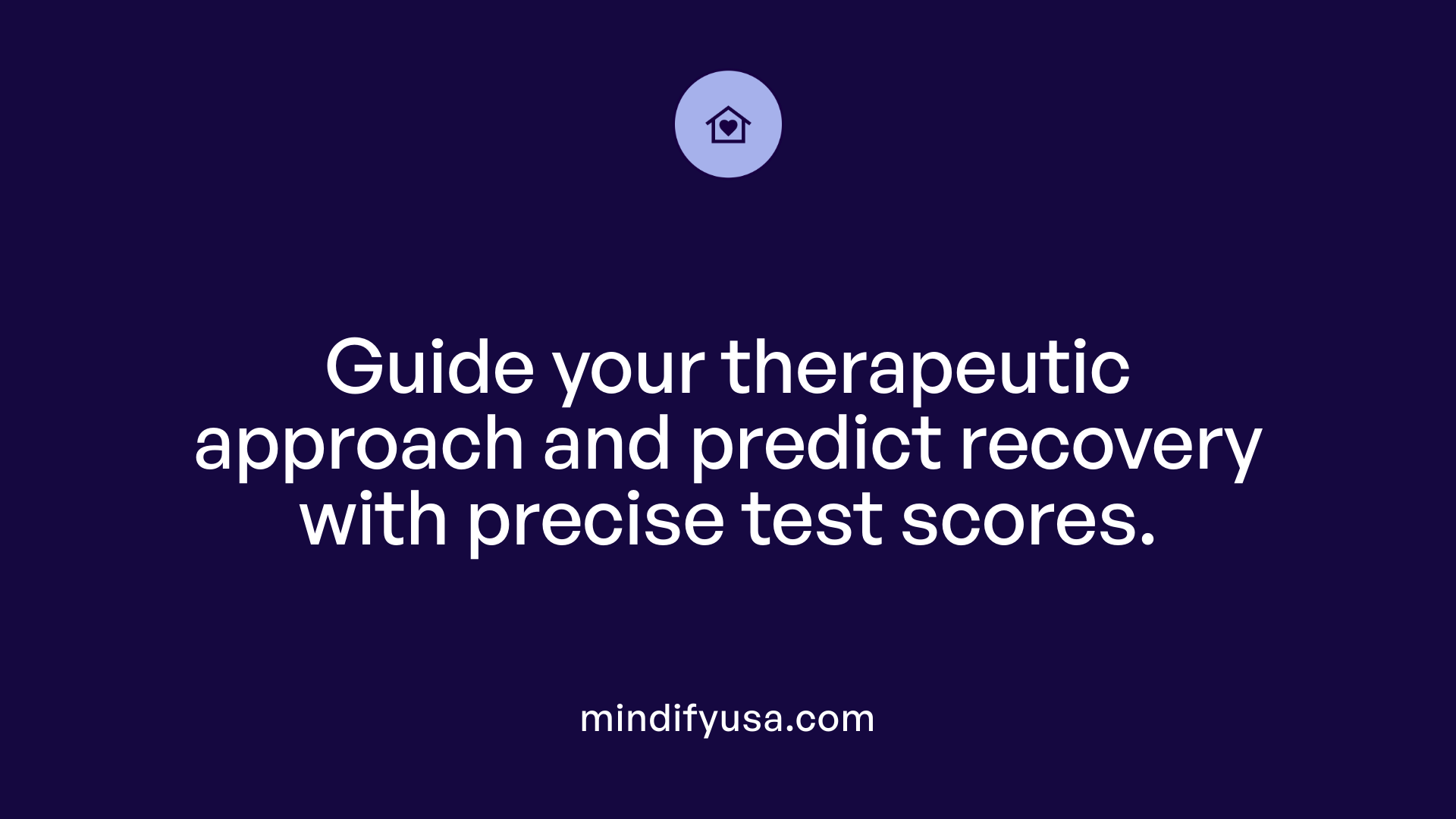
How do neuropsychological test scores help in clinical decision-making?
Neuropsychological test scores offer objective and standardized data about a person's cognitive, emotional, and behavioral functioning. These scores are interpreted in comparison to normative data, which helps clinicians understand how an individual performs relative to their peers of similar age and education level. By identifying significant deviations, clinicians can diagnose specific conditions such as types of dementia, brain injuries, learning disabilities, or psychiatric disorders.
The scores serve multiple purposes: they help differentiate among various diagnoses, establish baseline functioning, monitor changes over time, and inform prognosis. For example, in dementia evaluation, test results can clarify the type and severity of impairment, guiding decisions on treatment and care planning. They are also crucial in assessing a person’s decision-making capacity, which impacts decisions about medical treatment, legal responsibilities, and the ability to live independently. When integrated with clinical judgment and other diagnostic data, neuropsychological scores play a pivotal role in crafting personalized, evidence-based treatment plans.
Procedures and Their Relevance to Therapy Planning
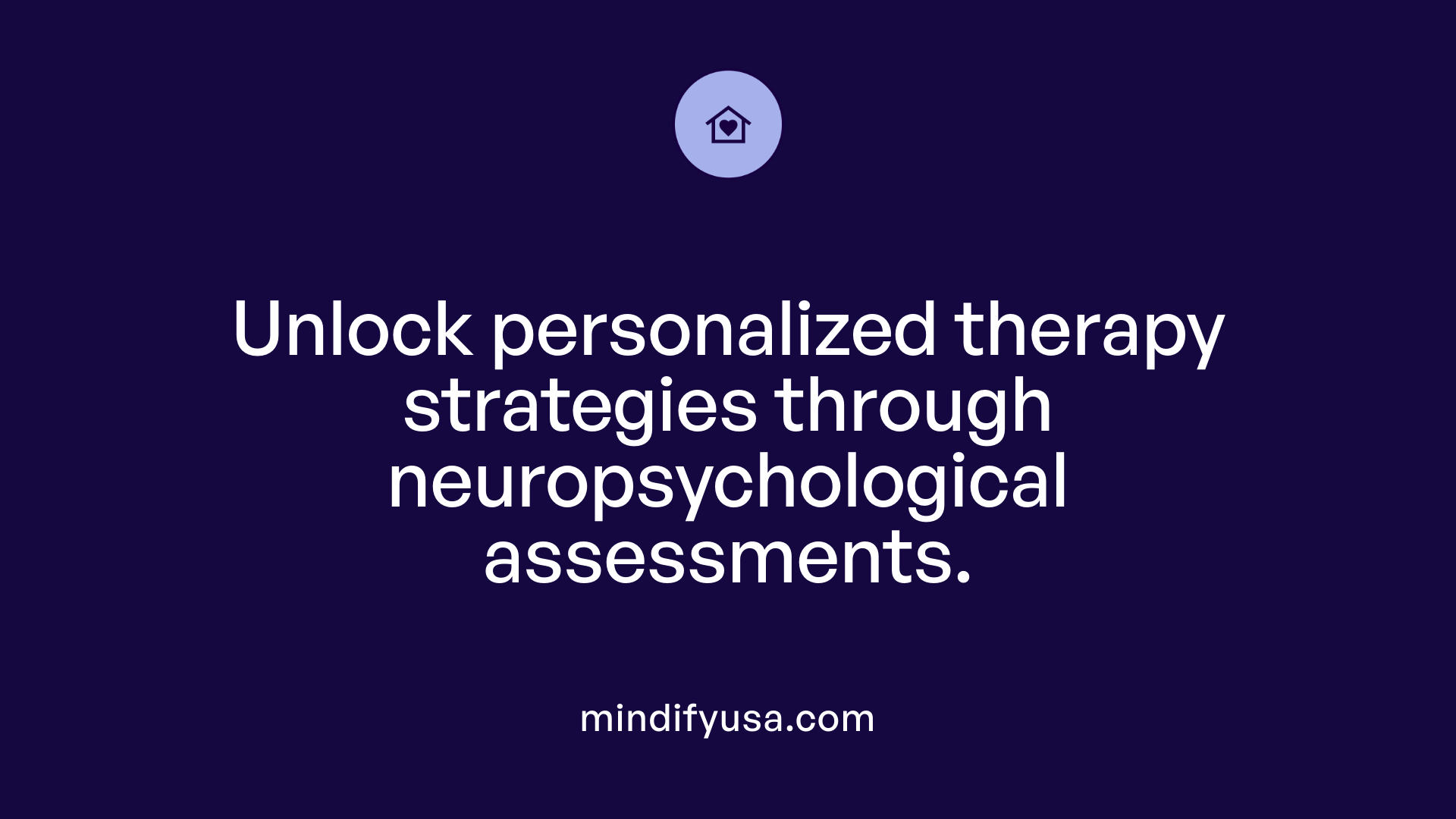
How are neuropsychological testing procedures relevant to therapy planning?
Neuropsychological testing procedures play a crucial role in developing effective therapy strategies. These standardized assessments provide detailed, objective insights into various aspects of brain function, including memory, attention, language, executive functioning, visuospatial skills, and emotional regulation.
By evaluating these key cognitive and emotional domains, clinicians can identify specific strengths and vulnerabilities unique to each individual. This information helps in the accurate diagnosis of conditions such as dementia, traumatic brain injuries, learning disabilities, or psychiatric disorders.
The comprehensive data obtained from tests guide clinicians in designing personalized treatment plans. For example, if a patient shows deficits in memory, therapy might focus on memory aids and compensatory strategies. If executive functioning is impaired, interventions could include problem-solving or organizational training.
Assessment results also assist in setting realistic goals for rehabilitation. They establish a baseline to measure progress over time and evaluate the effectiveness of interventions.
Standardized tests used in neuropsychological assessments include tools like the Wechsler scales for intelligence and memory, the Rey-Osterrieth Complex Figure Test for visuospatial skills, and tasks that evaluate language, attention, and emotional functioning.
Furthermore, these procedures help determine the patient’s decision-making capacity, their ability to perform daily activities safely, and their readiness to return to work or school. This comprehensive understanding ensures that therapy plans are tailored and adaptable, optimizing recovery outcomes.
In summary, neuropsychological testing procedures are indispensable in the therapy planning process because they provide detailed, reliable data. They translate complex brain functions into actionable information for clinicians, fostering targeted and effective interventions that address each individual's specific cognitive and emotional needs.
Benefits of Neuropsychological Testing in Therapy Contexts
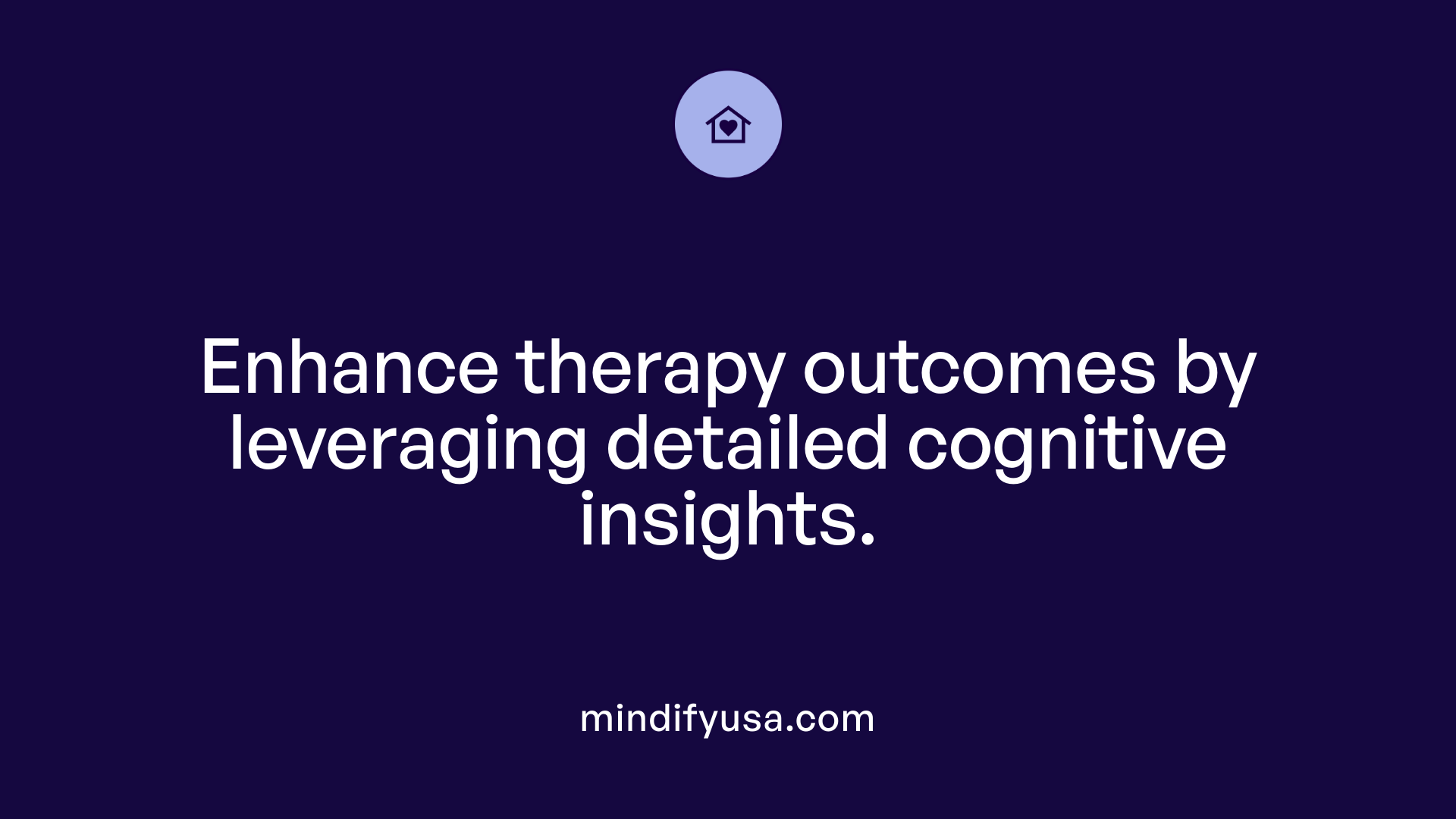
What are some benefits of using neuropsychological testing results in therapy?
Neuropsychological testing results offer a detailed overview of an individual's cognitive strengths and weaknesses. This comprehensive insight is crucial for accurate diagnosis, helping clinicians identify specific neurological, psychological, or developmental issues. These assessments can distinguish between various causes of cognitive or emotional challenges, such as aging-related decline, neurodegenerative conditions like dementia, brain injuries, or mental health disorders.
The information derived from testing guides the formulation of personalized treatment plans. It enables the development of targeted therapies, educational accommodations, and rehabilitation strategies that address specific deficits. Moreover, neuropsychological assessments establish baseline measures, allowing clinicians to monitor changes over time with consistent benchmarks.
These evaluations also assist in making practical decisions regarding daily life activities. For example, results can inform whether an individual is ready to return to work or drive safely, or if they need additional support in school or other settings. They are especially valuable in managing conditions like dementia, traumatic brain injury, or learning disabilities, by providing vital prognostic data.
Overall, neuropsychological testing enhances clinical decision-making. It supports tailored, evidence-based interventions and aims to improve outcomes by translating complex cognitive and emotional data into actionable therapy strategies. This personalized approach increases the likelihood of successful management and recovery, leading to better quality of life for patients.
Contributions to Diagnosis and Treatment Planning
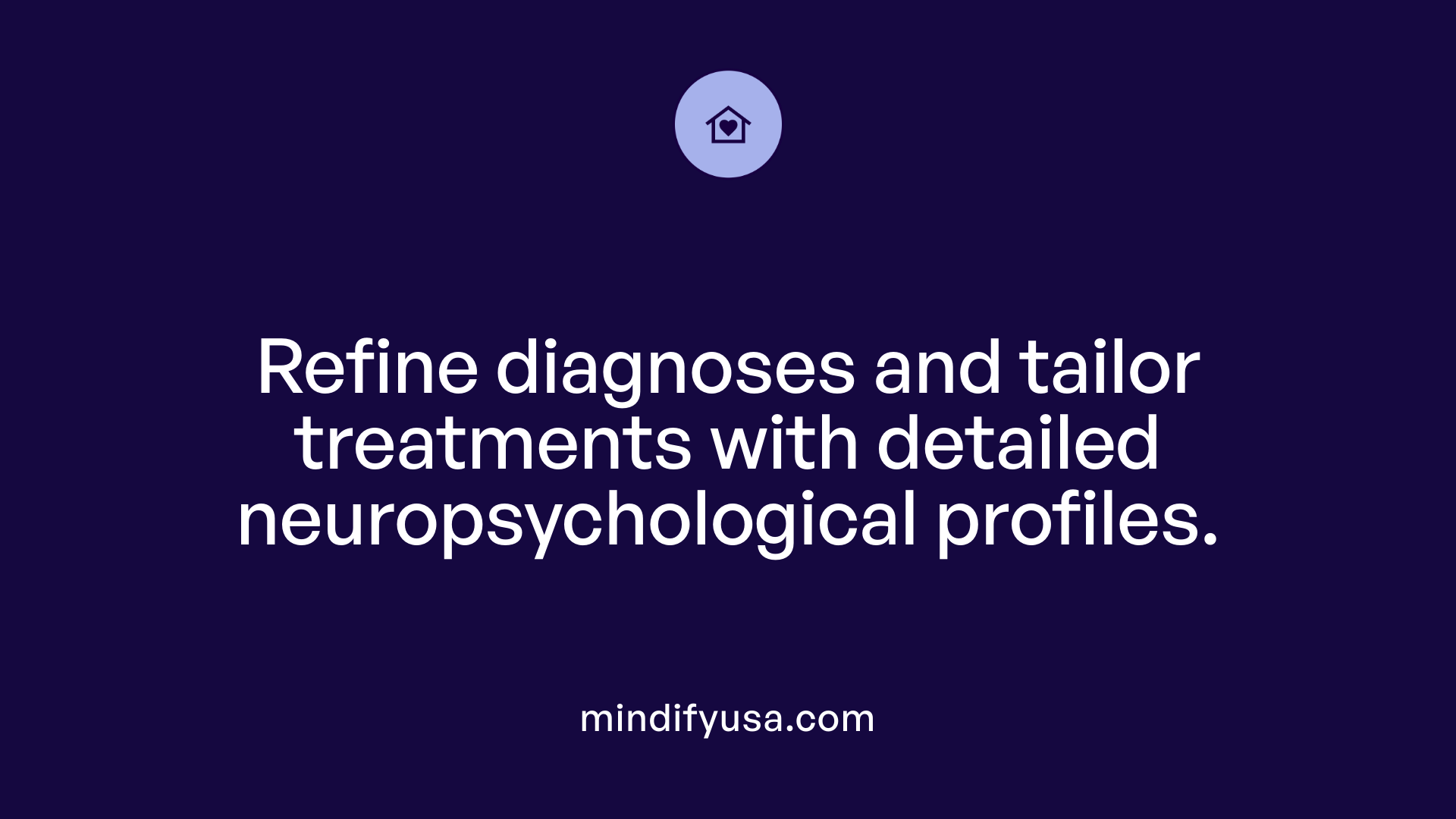
How do neuropsychological assessment results contribute to diagnoses and treatment?
Neuropsychological evaluations provide comprehensive insights into an individual's cognitive and emotional functioning. By conducting standardized tests across critical areas such as memory, attention, language, and executive functions, clinicians can identify specific deficits and strengths. This detailed profile helps differentiate among various brain disorders like Alzheimer’s disease, other forms of dementia, traumatic brain injury, or psychiatric conditions.
The assessments reveal patterns of strengths and vulnerabilities, which are instrumental in establishing accurate diagnoses. For instance, nearly 90% accuracy in distinguishing Alzheimer’s dementia from other causes highlights the utility of neuropsychological testing in precise diagnosis.
These detailed profiles not only aid in diagnosis but also serve as a foundation for developing personalized therapy plans. Clinicians can target specific cognitive deficits with tailored interventions, including cognitive rehabilitation, behavioral therapies, or medication management.
Tracking changes over time is another vital contribution of neuropsychological assessments. Repeated evaluations can monitor disease progression or recovery, helping to adjust treatments as needed.
In legal, educational, or employment contexts, assessment results can support decisions regarding disability, accommodations, or return-to-work readiness. They inform various interventions, ensuring that therapeutic efforts are grounded in concrete performance data.
The ability to compare test performances to normative data allows clinicians to understand the severity and scope of impairments, assign appropriate support, and predict functional outcomes. This comparison often involves composite scores derived from subtests, which provide a reliable overview of overall cognitive health.
Many tests are designed for specific purposes, such as the Wisconsin Card Sorting Test for executive function or the Rey-Osterrieth Complex Figure Test for visual-spatial skills. These targeted assessments help refine understanding and guide treatment plans.
Ultimately, neuropsychological evaluations are essential tools that translate complex brain functioning into actionable clinical information. They enhance the precision of diagnoses, individualize treatment strategies, and contribute to improved patient outcomes.
| Aspect of Neuropsychological Assessment | Role in Diagnosis and Treatment | Example Tests | Additional Notes |
|---|---|---|---|
| Identifying deficits | Establishes specific cognitive & emotional impairments | Memory tests, language assessments | Helps differentiate disorder types |
| Differentiating disorders | Confirms or rules out certain conditions | Dementia vs. psychiatric disorder | Supports accurate treatment planning |
| Guiding therapies | Provides data to develop targeted interventions | Cognitive rehab, behavioral therapy | Tailors therapy to individual needs |
| Tracking progress | Monitors changes over time | Repeat assessments | Adjusts interventions as needed |
| Functional predictions | Foresees patient capabilities | Performance-based tests | Aids in legal & care decisions |
| Supporting legal & educational decisions | Provides documented evidence | Standardized normative comparisons | Clarifies disability or accommodation needs |
Neuropsychological evaluations form an integral part of comprehensive clinical care, bridging the gap between complex brain processes and effective treatment development.
Integrating Assessments into Holistic Care Approaches
Neuropsychological evaluations play a vital role in guiding treatment strategies by providing detailed, evidence-based insights into brain functioning. These assessments enable clinicians to develop personalized therapy plans, monitor progress, and adapt interventions to optimize outcomes. By translating cognitive profiles into targeted therapeutic actions, neuropsychological testing enhances the quality, precision, and effectiveness of care—whether for neurodegenerative diseases, brain injuries, learning disabilities, or mental health conditions. Incorporating comprehensive evaluation data into a multidisciplinary approach ensures that patients receive the most appropriate, effective, and holistic treatment, ultimately improving their quality of life and functional independence.
References
- Neuropsychological Evaluations in Adults - AAFP
- How Neuropsychological Evaluations Guide Treatment
- Comprehensive Guide to Neuropsychological Testing and Evaluations
- Neuropsychological Testing - M Health Fairview
- Neuropsychological Assessment Patient's Guide
- Neuropsychological Evaluations: A Comprehensive Guide
- How to Interpret Neuropsychological Test Results






































































































